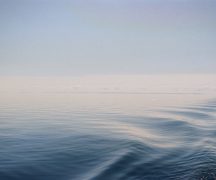By DAVID DUPONT
BG Independent News
Sylvia Earle wants to take tuna off the menu. The same with swordfish and orange roughy.
The appetite for fish is depleting the fish population, and that disrupts the ecosystem of the ocean, and that’s a threat to the human population.
Large scale commercial fishing is one of many attack on the oceans.
“We’ve become so skilled at extracting wild life from oceans, streams and lakes that we’re seeing an unprecedented decline in population,” the marine biologist and explorer said.
Earle was at Bowling Green State University Tuesday to give a talk based on her book “The World Is Blue.”
When she was a child, she said, people couldn’t see Earth from outer space. Now children grow up knowing the photo of the blue planet. Yet humans are just coming round to understanding the importance of protecting those vast blue stretches. “No ocean,” Earle said,” no us. No blue, no green. We need water.”
Those oceans, whether saltwater or the vast freshwater bodies such as Lake Superior, rely on intricate systems. Just like a computer, removing one small part means it doesn’t work so well.
“The attitude has been the ocean is too big to fail,” Earle said. But “never before has the change happened so rapidly or as comprehensively.” Except, she added, 65 million years ago when a comet hit Earth.
Those changes have brought increased prosperity for humans, but not so much for wildlife, except cockroaches and rats.
That period has also been a great age for exploration. Only in the last several decades could people venture beyond where light penetrates, into the dark depths of the ocean.
Earle was on the forefront as the first woman aquanaut. She had to convince officials that a woman could handle the job. Now she’s one of the most prominent explorers.
In 1986 when she went on her first mission she was the only woman among 79 men. Recent photos she projected as part of her talk included a larger number of women.
The vastness of the ocean leaves much to explore. The average depth is two and a half miles, the deepest parts are seven miles deep.
An enthusiast for marine exploration she urged her listeners “to take the plunge” if they have the opportunity.
The over fishing of large species is not the only problem. The decline of algae plays a part in the bleaching of the Great Barrier Reefs.
Prochlrococcus, a bacteria so small it was only identified in 1986, generates 20 percent of the world’s oxygen and also takes up carbon.
Nations around the world are setting aside Marine Protected Areas. (Some have exceptions for local, subsistence fishing.) These give the ecosystems a chance to rebound. But only 3 percent of the oceans have been set aside.
Treating the waterways as a sewer and place to dispose of trash, much of it plastic, puts those systems at risk.
Somehow, she said, humans survived for centuries without plastic. Now it is seen as an essential.
She advocated for collecting and repurposing what could be. Reducing how much is used — lips do a fine job of getting liquid from a cup in most cases — and reusing plastic implements that we do have. Throwing things away is not an option. “There is no away.”
Young people are taking the lead in these efforts. In answering a question from a 9-year-old in the audience, Earle told the story of a girl who took it upon herself to clean up trash from a beach in Texas. She didn’t ask for help but when others saw what she was doing, they began to help. This launched a much larger cleanup effort.
“Progress always starts with someone doing something.”
Earle places her hopes on the “superpowers” of the young. Maybe they will become scientists, or photographers, or writers. “And some don’t mind getting wet.”
Everyone, she said, “has the power of restraint. … It is a choice what we do every day — what we do, what we fail to do; what we eat; what we wear; where we go — every decision has a consequence.”
People have the power to understand those consequences.
Her strong motivators are her four grandsons, Earle said. People ask what they can do to make a difference. “I say: ‘Get a kid.’ If you don’t have one, borrow one. Take them on a walk in a wild place, the woods, a beach.”
Think about what their world will look like 50 years from now. “Get them to say what kind of world do you want? … Set a goal and then go for it. The world we want is one better than what we’ve got.”


